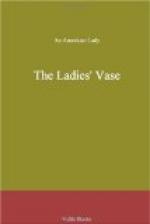Novel-reading produces a morbid appetite for excitement. The object of the novelist, generally, is to produce the highest possible degree of excitement, both of the mind and the passions. The object is very similar to that of intoxicating liquors on the body: hence, the confirmed novel-reader becomes a kind of literary inebriate, to whom the things of entity have no attractions, and whose thirst cannot be slaked, even with the water of life. And as intoxication enfeebles the body, and engenders indolent habits, so this unnatural stimulus enfeebles the intellectual powers, induces mental indolence, and unfits the mind for vigorous efforts. Nothing less stimulating than its accustomed aliment can rouse such a mind to action, or call forth its energies; and then, being under the influence of mental intoxication, which dethrones reason and destroys the power of self-control, they are always misdirected.
It also promotes a sickly sensibility. Dr. Brigham, speaking of the too powerful excitement of the female mind, says: “In them the nervous system naturally predominates. They are endowed with quicker sensibility and far more active imagination than men. Their emotions are more intense, and their senses alive to more delicate impressions. They therefore require great attention, lest this exquisite sensibility—which, when properly and naturally developed, constitutes the greatest excellence of woman—should either become excessive by too strong excitement, or suppressed by misdirected education.” Novel-reading produces just the kind of excitement calculated to develop this excessive and diseased sensibility; and the effect is, to fill the mind with imaginary fears, and produce excessive alarm and agitation at the prospect of danger, the sight of distress, or the presence of unpleasant objects; while no place is found for the exercise of genuine sympathy for real objects of compassion. That sensibility which weeps over imaginary woes of imaginary beings, calls forth but imaginary sympathy. It is too refined to be excited by the vulgar objects of compassion presented in real life, or too excitable to be of any avail in the relief of real distress. It may faint at the sight of blood, but it will shrink back from binding up the wound. If you wish to become weak-headed, nervous, and good for nothing, read novels. I have seen an account of a young lady, who had become so nervous and excitable, in consequence of reading novels, that her head would be turned by the least appearance of danger, real or imaginary. As she was riding in a carriage over a bridge, in company with her mother and sister, she became frightened at some fancied danger, caught hold of the reins, and backed the carriage off the bridge, down a precipice, dashing them to pieces.
This excessive sensibility renders its possessor exquisitely alive to all those influences which are unfriendly to human happiness, while it diminishes the power of endurance. Extreme sensibility, especially in a female, is a great misfortune, rendering the ills of life insupportable. Great care should therefore be taken that, while genuine sensibility is cherished, its extremes should be avoided, and the mind fortified by strengthening the higher powers.




